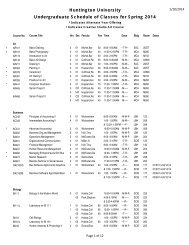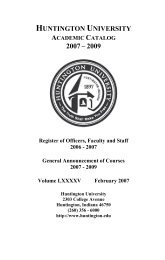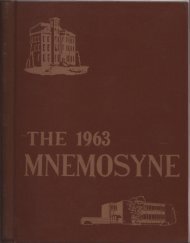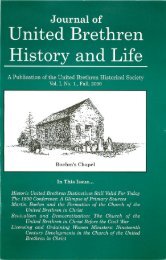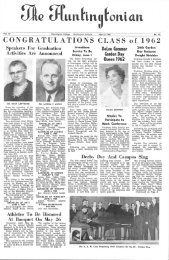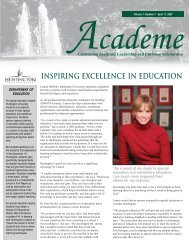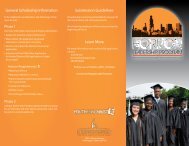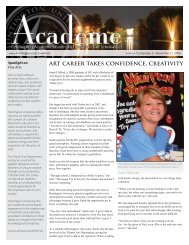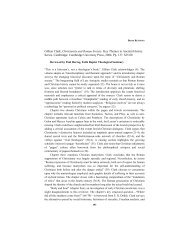THE MISSIONARY MONTHLY - Huntington University
THE MISSIONARY MONTHLY - Huntington University
THE MISSIONARY MONTHLY - Huntington University
You also want an ePaper? Increase the reach of your titles
YUMPU automatically turns print PDFs into web optimized ePapers that Google loves.
giving them all the personal help he could. Two churches<br />
were organized, the Friends and the Methodists. They<br />
are still working in perfect fellowship.<br />
Employees were encouraged to leave leaky cabins and<br />
move into little homes of their own, their wages being<br />
adjusted so that they could make small payments until<br />
the happy day arrived when they could claim a clear title<br />
and have the deed for their very own. More than twenty<br />
families are today occupying homes which were secured<br />
in this way. One young woman aided her husband in<br />
paying for their cottage by doing laundry work at the<br />
“ big house” . Two old colored men, born slaves and now<br />
nearing the century mark, are still well, and happy in the<br />
service of the Woody family.<br />
The wilderness and solitary place has been made glad<br />
by Christian example and the Gospel.<br />
Newton W oody’s influence is still felt in Moore County<br />
which has become a great in d u stria l section of North<br />
Carolina. A member of his fam ily wrote the American<br />
Bible Society concerning the observances of Bible Sunday<br />
in that section:<br />
“ I am a ‘ Shut-in’ mostly, but I had officials of the<br />
. churches in this and other sections who took the posters<br />
to different localities to post in the churches and to present<br />
the subject of the undelivered Bibles. The superintendents<br />
of Sunday-schools or teachers in a dozen or more<br />
schools presented the little folders to classes' as book-marks<br />
if the pupils would remember as they saw the appealing<br />
folder to pray that the Bible might be set free to go on<br />
its errands of mercy. I sent many letters to friends to<br />
awaken interest in faraway places. One mission worker,<br />
a stranger, informed me the folder she received cost her<br />
$10.00— that she sent the money for distribution of Bibles<br />
in Korea. My work has been only seed sowing. I enclose<br />
my check for $5.00 for this privilege. I will follow up<br />
the work as I can.”<br />
HOW MORMONS TRAIN CHILDREN<br />
The school of week-day religious instruction has been<br />
appropriated by the Mormons, according to the Presbyterian<br />
Magazine. In many communities where there are<br />
no “ Gentiles” to oppose, there is constant and unhindered<br />
teaching of their faith within the public school building.<br />
Elsewhere they have had academies or church schools.<br />
But with the coming of the high school they have abolished<br />
the academies. They depend on the public funds to<br />
educate their children, but a few feet away they build a<br />
“ seminary.” They have about sixty of these two-room<br />
buildings. Leading from the high school to the seminary<br />
is a cinder path and when school is dismissed announcement<br />
is made of the religious school to follow. Often it<br />
is so made that pupils who do not go are marked. (Schoolmates<br />
do not hesitate to dub them “ heathen” ). Teachers<br />
well-versed in the Mormon doctrine give their time for<br />
instruction in these seminaries. Thus the constant teaching<br />
of children begun at four years of age is carried<br />
through the high school period. No wonder that their<br />
growing youth, though intelligent, are confirmed in their<br />
faith.— Missionary Review of the World.<br />
A DECAYING CHURCH<br />
Some one tells a story of an artist who was once asked<br />
to paint a picture of a decaying church. To the astonishment<br />
of many, instead of putting on the canvas an old,<br />
tottering ruin, the artist painted a stately edifice of modern<br />
grandeur. Through the open portals could be seen the<br />
richly carved pulpit, the magnificent organ, and the beautiful<br />
stained glass windows.<br />
<strong>THE</strong> <strong>MISSIONARY</strong> <strong>MONTHLY</strong> 7<br />
Within the grand entrance was an offering plate of<br />
elaborate design for the offering of fashionable worshipers.<br />
But— and here the artist’s conception of a decaying church<br />
was made known— right above the offering plate, suspended<br />
from a nail in the wall there hung a square box,<br />
bearing the legend,<br />
“ FOR FOREIGN MISSIONS,”<br />
but right over the slot through which contributions ought<br />
■—to have gone, he had painted a huge cobweb!— Advent<br />
Christian Missions.<br />
AN OPEN LETTER TO JUDGES<br />
By Junius Channing Quincy<br />
With your permission I want to reason with you concerning<br />
your method of dealing with the violator of the<br />
prohibition laws.<br />
Suppose a counterfeiter were brought before the court<br />
and proved to be guilty. Would it be any service to the<br />
country in restraining the crime of counterfeiting if<br />
the court were to fine the criminal ten thousand dollars<br />
and permit him to pay the fine with good money obtained<br />
from victims in exchange for his counterfeit money—<br />
setting him free to go and make more counterfeit money?<br />
You will answer “ Certainly, not,” and you will snort<br />
at the absurdity of the illustration.<br />
And yet that is exactly in kind what many of you do<br />
with the violator of the prohibition laws. You fine him<br />
and then set him free to sell more counterfeit whisky<br />
to get more good money to pay the fine.<br />
And it is just such timid if not venal proceeding on<br />
the part of some of our courts which help along the criminal<br />
combine between the bootlegger and the local official<br />
who protects him.<br />
The original offending is not in the court. But the<br />
court has the authority to check by severe punishment<br />
all offending which reaches the court; and to make salutary<br />
example which will send fear into all the rings of<br />
evil doers:.<br />
As one who has observed the court for many years I<br />
avow this to be a fa ct:— One resolute judge can terrorize<br />
crime within his jurisdiction. He can subdue it to a<br />
minimum within his bailiwick. Once it shall be known<br />
that the offender receives the limit of the law as a sentence<br />
from the judge, the criminals will flee from the range<br />
of his authority as rats flee a place where other rats have<br />
succumbed to rat poison.<br />
All this is known to you judges. Are you willing to<br />
risk the peace of your community, the proper interest of<br />
taxpayers, the safety of your fellow citizens and even of<br />
your own family, by making light sentences— fine or very<br />
trivial imprisonment— upon the violators of the prohibition<br />
laws?<br />
They are just as guilty as counterfeiters. And they<br />
should receive the same kind of severe sentence up to<br />
the limit of the law.<br />
Pile on the fines to the confiscatory point with the ignorant<br />
bootlegger who is in the business for gain. Put<br />
him away behind prison bars long enough to break up<br />
his business. And send the pretended respectable member<br />
of society, who violates the law, to jail for the full<br />
limit permitted under the statute-— so that the disgrace<br />
will brand him before all his community as an ordinary<br />
criminal.<br />
It is true that the responsibility for the saturnalia<br />
does not begin with you; but it ends' with you.<br />
You can stop much of it, if you will.— The Christian<br />
Statesman.



